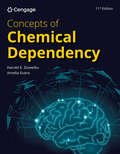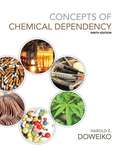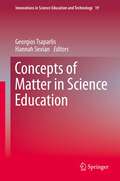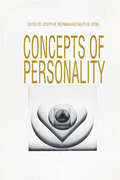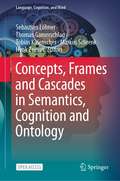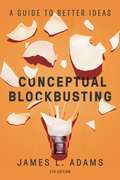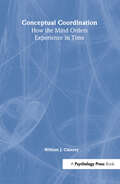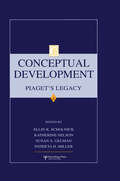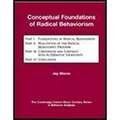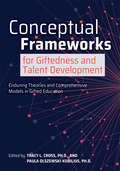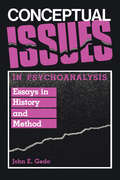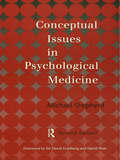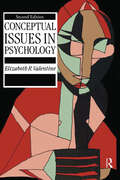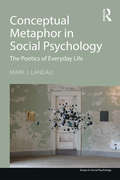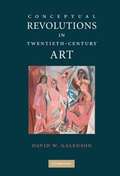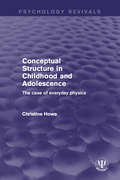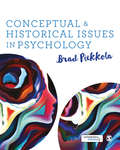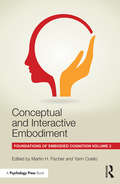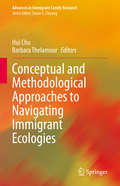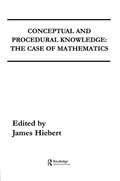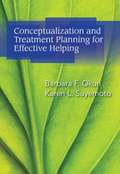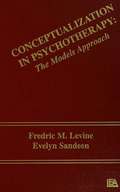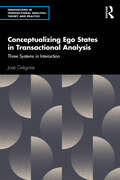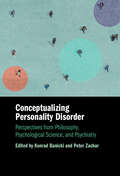- Table View
- List View
Concepts of Chemical Dependency (Mindtap Course List)
by Harold E. Doweiko Amelia L. EvansDoweiko/Evans' CONCEPTS OF CHEMICAL DEPENDENCY, 11th EDITION, provides comprehensive coverage and the latest information on a spectrum of substance use disorders and the substances commonly misused. Author Amelia Evans, continuing Harold Doweiko’s work on prior editions, also covers topics not usually discussed in other substance use disorder texts, including anabolic steroids, inhalants, infectious diseases associated with substance misuse, the medical cannabis debate, and how the "war on drugs" has contributed to the problem of substance use disorders. Students report that they appreciate the balanced approach, which allows them to form their own opinions and doesn't preach that "drugs are bad for you." This edition includes new information on recent reports expanding beyond the United States and updates reflecting new preferred language to reduce stigma. It also has a perspective beyond the United States for a more worldwide understanding of substance use disorders.
Concepts of Chemical Dependency (Ninth Edition)
by Harold E. DoweikoCONCEPTS OF CHEMICAL DEPENDENCY, Ninth Edition, provides comprehensive coverage and the latest information on a full spectrum of substance use disorders and the compounds commonly abused. Topics include the abuse of and addiction to alcohol; how the active agent in marijuana, THC, affects neural growth and development; the emerging body of evidence suggesting a relationship between marijuana abuse and psychotic disorders; the emerging body of evidence suggesting that marijuana is not as benign as it was thought to be a few years ago; and the abuse of cough syrups. Adding to the book's usefulness and relevance, Doweiko also covers topics not usually discussed in other substance abuse texts, including abuse of anabolic steroids, inhalants, infectious diseases associated with substance abuse, how the "war on drugs" has actually contributed to the problem of substance abuse/addiction in this country, and the "medical marijuana" debate. This edition includes new information on synthetic marijuana, mephredone, and dextromethorphan, among other substances; updates reflecting the new DSM-5; and a new chapter on the Biopsychosocial Model of Addiction. Students report that they appreciate the author's balanced approach, which allows them to form their own opinions, in contrast to some books that "preach" that "drugs are bad for you."
Concepts of Matter in Science Education (Innovations in Science Education and Technology #19)
by Georgios Tsaparlis Hannah SevianBringing together a wide collection of ideas, reviews, analyses and new research on particulate and structural concepts of matter, Concepts of Matter in Science Education informs practice from pre-school through graduate school learning and teaching and aims to inspire progress in science education. The expert contributors offer a range of reviews and critical analyses of related literature and in-depth analysis of specific issues, as well as new research. Among the themes covered are learning progressions for teaching a particle model of matter, the mental models of both students and teachers of the particulate nature of matter, educational technology, chemical reactions and chemical phenomena, chemical structure and bonding, quantum chemistry and the history and philosophy of science relating to the particulate nature of matter. The book will benefit a wide audience including classroom practitioners and student teachers at every educational level, teacher educators and researchers in science education. "If gaining the precise meaning in particulate terms of what is solid, what is liquid, and that air is a gas, were that simple, we would not be confronted with another book which, while suggesting new approaches to teaching these topics, confirms they are still very difficult for students to learn". Peter Fensham, Emeritus Professor Monash University, Adjunct Professor QUT (from the foreword to this book)
Concepts of Personality
by Joseph M. Wepman Ralph W. HeineThe psychologist who pursues an interest in personality is constantly faced by a dilemma. He seeks to investigate what is to him the most intriguing and interesting subject--the multifaceted operations of man in his natural environment. The predicament lies in the discrepancy between the complexity and richness of man's subjective experience, and the pallid analog of these experiences the psychologist is able to study effectively with the research procedures available to him. In Concepts of Personality Joseph M. Wepman and Ralph W. Heine offer a comprehensive survey of classical and contemporary personality theory, including a wide array of examples of these two trends.If the psychologist holds to the premises of strict objectivity through controlled observations, he finds himself driven to the periphery of the very problem he seeks to understand. This is a place where the reliability of measurement and the validity and predictability of his instruments can often be specified, but only at the cost of abandoning the goal of useful generality or of application to the individual in his ordinary life circumstances. Concepts of Personality, unlike most books on the subject, is not limited to broad, general theories. It includes chapters on basic processes--learning, perception, genetics, and drive theory; on the major analytical approaches of psychology and psychiatry; on anthropological and sociological contributions; and on the problems of measurement and assessment. Each chapter is by an authority on the point of view expressed.The editors' introduction, itself a major essay on the complex and divergent patterns and themes of contemporary views of personality, carefully leads the reader through the information at hand. The book as a whole constitutes an encyclopedic summary of the state of the science.
Concepts, Frames and Cascades in Semantics, Cognition and Ontology (Language, Cognition, and Mind #7)
by Thomas Gamerschlag Henk Zeevat Markus Schrenk Sebastian Löbner Tobias KalenscherThis open access book presents novel theoretical, empirical and experimental work exploring the nature of mental representations that support natural language production and understanding, and other manifestations of cognition. One fundamental question raised in the text is whether requisite knowledge structures can be adequately modeled by means of a uniform representational format, and if so, what exactly is its nature.Frames are a key topic covered which have had a strong impact on the exploration of knowledge representations in artificial intelligence, psychology and linguistics; cascades are a novel development in frame theory. Other key subject areas explored are: concepts and categorization, the experimental investigation of mental representation, as well as cognitive analysis in semantics. This book is of interest to students, researchers, and professionals working on cognition in the fields of linguistics, philosophy, and psychology.
Conceptual Blockbusting: A Guide to Better Ideas, Fifth Edition
by James L. AdamsA thoroughly revised edition of the classic on creativity, essential for individuals and teams who want to think outside the box. Some people are naturally creative and others aren't, right? Wrong. In this classic book on creativity, James Adams takes a unique approach to generating ideas and solving problems that has captivated, inspired, and guided thousands of people from all walks of life to new heights of creativity-whether you are a writer with writers block, or a businesswoman struggling to come up with a new organizational structure. More than three decades after its original publication, Conceptual Blockbusting has never been more relevant, powerful, or fresh. Integrating insights from the worlds of psychology, engineering, management, art, and philosophy, Adams identifies the key blocks (perceptual, emotional, cultural, environmental, intellectual, and expressive) that prevent us from realizing the full potential of our fertile minds. Employing unconventional exercises and other interactive elements, Adams shows individuals, teams, and organizations how to overcome these blocks, embrace alternative ways of thinking about complex problems, and celebrate the joy of creativity. Completely revised and updated with the latest cognitive science and addressing new subjects such as changes in technology, creativity in large groups, and sustaining creativity over time, Conceptual Blockbusting will introduce a new generation of readers to a world of new possibilities.
Conceptual Coordination: How the Mind Orders Experience in Time
by William J. ClanceyThis book bridges the gap between models of human behavior that are based on cognitive task analysis and those based on neural networks. The author argues that these approaches are incomplete and not properly related to each other. His synthesis reconciles the very different conceptualizations of human memory assumed by these two approaches by assuming that 'what the brain remembers' is not a collection of symbols or neurons or even networks of either of these, but rather how to coordinate behavior in time, relating different modalities of conception and movement. A second premise is that behavior sequences are categorized, with perceptual categorizations (sounds, images) comprising the first order of categorization and conceptual categorizations of perceptions and actions in time comprising the second order. The conceptual categorizations are themselves sequenced and categorized, corresponding to the familiar classification hierarchies in cognitive models. Inspired by Bartlett's work, the author seeks to develop a theory of "process memory"--memory for experience in time. Following the methodology of situated cognition, he finds clues in the particulars of human activity, such as typing errors, how a computer interface is used, how a child learns to play in a swimming pool, odd limitations in language comprehension, and so on. Throughout, he examines existing (and often famous) cognitive and neural models with respect to these phenomena. In each case, he attempts to show that the experienced behavior can be understood as sequences of categories being reactivated, substituted, and composed. Ultimately, this analysis is shown to be the link that may lead to improvement of both symbolic and neurally based models of memory and behavior, with concomitant implications for cognitive psychology, artificial intelligence, and cognitive science as a whole.
Conceptual Development: Piaget's Legacy (Jean Piaget Symposia Series)
by Katherine Nelson Patricia H. Miller Susan A. Gelman Ellin Kofsky ScholnickThis book examines a key issue in current cognitive theories - the nature of representation. Each chapter is characterized by attempts to frame hot topics in cognitive development within the landscape of current developmental theorizing and the past legacy of genetic epistemology. The chapters address four questions that are fundamental to any developmental line of inquiry: How should we represent the workings and contents of the mind? How does the child construct mental models during the course of development? What are the origins of these models? and What accounts for the novelties that are the products and producers of developmental change? These questions are situated in a historical context, Piagetian theory, and contemporary researchers attempt to trace how they draw upon, depart from, and transform the Piagetian legacy to revisit classic issues such as the child's awareness of the workings of mental life, the child's ability to represent the world, and the child's growing ability to process and learn from experience. The theoretical perspectives covered include constructivism, connectionism, theory-theory, information processing, dynamical systems, and social constructivist approaches. The research areas span imitation, mathematical reasoning, biological knowledge, language development, and theory of mind. Written by major contributors to the field, this work will be of interest to students and researchers wanting a brief but in-depth overview of the contemporary field of cognitive development.
Conceptual Foundations Of Radical Behaviorism
by John C. MooreConceptual Foundations of Radical Behaviorism is intended for advanced undergraduate or beginning graduate students in courses within behavior analytic curricula dealing with conceptual foundations and radical behaviorism as a philosophy. Each chapter of the text presents what radical behaviorism says about an important topic in a science of behavior, and then contrasts the radical behaviorist perspective with that of other forms of behaviorism, as well as other forms of psychology.
Conceptual Frameworks for Giftedness and Talent Development: Enduring Theories and Comprehensive Models in Gifted Education
by Paula Olszewski-Kubilius Tracy CrossConceptual Frameworks for Giftedness and Talent Development explores current and enduring theories and comprehensive models of giftedness and talent development. Each chapter:Includes a description of a different model, theory, or framework.Shares the most important implications of each model, including underrepresentation and social justice issues.Provides commentary on how each model compares to others.Includes discussion questions for use with students and professionals.The editors also consider common issues across conceptual frameworks, such as the degree to which achievement defines giftedness, the goal of gifted education, and the role of psychosocial factors. This is a comprehensive reference for scholars and practitioners in the field, as well as those studying at the graduate level.
Conceptual Issues in Psychoanalysis: Essays in History and Method
by John E. GedoIn Conceptual Issues in Psychoanalysis, John Gedo's mastery of Freudian theory and broad historical consciousness subserve a new goal: an understanding of "dissidence" in psychoanalysis. Gedo launches his inquiry by reflecting expansively on recent assessments of Freud's character. His acute remarks on the intellectual and personal agendas that inform the portraits of Freud offered by Frank Sulloway, Jeffrey Masson, and Peter Swales pave the way for his own definition of psychoanalysis in historical context. Then, in topical studies on Sandor Ferenczi, Melanie Klein, and Heinz Kohut, he explicates the commonalities that bind together three generations of dissidents, each of whom undertook to supplant the edifice of hypotheses erected by Freud with alternative theories. Interspersed with these essays are quite insightful studies of Lou Andreas-Salome and David Rapaport, whom Gedo sees as "epistemological referees" attempting to reconcile viewpoints unique to their generations. In the second part of the book, Gedo argue that analysis now has the opportunity to move beyond this pattern of dissidence followed by mediation by drawing on observational research about infancy and early childhood to validate or refute its clinical hypotheses. In these chapters, Gedo offers critical commentary on recent efforts to extrapolate from infant research to the psychoanalytic theory of development. Only then does he offer his own measured estimation of the "legacy of infancy and the technique of psychoanalysis." This review of "the challenge of scientific method" as it bears on analysis culminates in concluding chapters that probe the status of analysis as a hermeneutic discipline and the contribution of analysis to "vocabularies of moral deliberation."
Conceptual Issues in Psychological Medicine: Collected Papers Of Michael Shepherd
by the late ShepherdConceptual Issues in Psychological Medicine is a collection of papers written by the celebrated psychiatrist, Michael Shepherd, who was one of the originators of psychiatric epidemiology in the UK and a leading social psychiatrist of his generation. He designed and implemented some of the first systematic studies into what are now widely recognised clinical syndromes. His extensive research experience and his advocacy of a scientific approach to social psychiatry form the basis of the essays contained in this book. Covering such issues as the development of research strategy and the difficulties involved in completing psychiatric studies, Shepherd's papers address many of the issues currently facing professionals in this field. He writes authoritatively and engagingly on clinical syndromes, the history of ideas and the use of the epidemiological approach in psychiatry. Conceptual Issues in Psychological Medicine stimulates and informs the reader in equal measure; it will be a welcome addition to the bookshelf of any practitioner of medicine.
Conceptual Issues in Psychology
by Elizabeth R. ValentineFirst published in 1991. Routledge is an imprint of Taylor & Francis, an informa company.
Conceptual Metaphor in Social Psychology: The Poetics of Everyday Life (Essays in Social Psychology)
by Mark J. LandauWe learn in grade school that metaphor is an ornamental figure of speech reserved for poets. But we now know that it is also a key strategy people use to make sense of the world, from basic concepts like time and causation to the major social issues facing society. In this book, Mark Landau clarifies with wide-ranging evidence the many ways conceptual metaphor guides our thoughts and actions, shining a light on the cognitive underpinnings of social life. Conceptual Metaphor in Social Psychology synthesizes over twenty-five years of in-depth research. Drawing from innovative experiments conducted around the globe, Landau shows conclusively that individuals and groups use metaphor—often unconsciously—to grasp abstractions, make judgments and decisions, communicate, and organize their behavior. Each chapter explores metaphor’s importance for understanding a major topic in social psychology: social cognition, motivation, culture, the self, interpersonal relationships, intergroup dynamics, politics, and health. What emerges is a powerful explanation of how social behavior is shaped by and reflected in our bodily functioning, cultural context, and language use. Integrating insights from cognitive linguistics, anthropology, and personality, this book makes a compelling case that conceptual metaphor has a pervasive effect on human affairs. Researchers in social psychology will discover new ways to think about and investigate these related topics, while students of psychology will learn about an exciting development in understanding enduring questions about who we are and how we got that way.
Conceptual Revolutions in Twentieth-Century Art
by David W. GalensonFrom Picasso's Cubism and Duchamp's readymades to Warhol's silkscreens and Smithson's earthworks, the art of the twentieth century broke completely with earlier artistic traditions. A basic change in the market for advanced art produced a heightened demand for innovation, and young conceptual innovators - from Picasso and Duchamp to Rauschenberg and Warhol to Cindy Sherman and Damien Hirst - responded not only by creating dozens of new forms of art, but also by behaving in ways that would have been incomprehensible to their predecessors. Conceptual Revolutions in Twentieth-Century Art presents the first systematic analysis of the reasons for this discontinuity. David W. Galenson, whose earlier research has changed our understanding of creativity, combines social scientific methods with qualitative analysis to produce a fundamentally new interpretation of modern art that will give readers a far deeper appreciation of the art of the past century, and of today, than is available elsewhere.
Conceptual Structure in Childhood and Adolescence: The Case of Everyday Physics (Psychology Revivals)
by Christine Howe‘Heat breaks up charcoal and puts sulphur dioxide in’; ‘The air pulls faster on heavy masses.’ These and other similar statements by school-aged children untutored in physics carry two messages. First, children’s pre-instructional conceptions of the physical world are a far cry from the received wisdom of science; second, despite their lack of orthodoxy, children’s conceptions carry a definite sense of causal mechanism. This sense of mechanism is the focal concern of this book, originally published in 1998, for it raises issues of central importance to both psychological theory and educational practice. In particular, some psychologists have claimed that human cognition is organised around causal mechanisms along the lines of a theory. This carries specific implications for teaching. Does the existence in children’s thinking of causal mechanisms relating to the physical world support these psychologists? Does this have consequences for the teaching of science? Christine Howe reviews evidence relating to pre-instructional conceptions in three broad topic areas: heat and temperature; force and motion; floating and sinking. A wide range of published work is discussed, including the author’s own research. In addition, a new study covering all three topic areas is reported for the first time. The message is that causal mechanisms can indeed play an organising role, that untutored cognition can in other words be genuinely theoretical. However, this tendency is highly domain-specific, occurring in some topic areas but not in others. Having drawn these conclusions, Christine Howe discusses their meaning in terms of both cognitive development and educational practice. A model is outlined which synthesises Piagetian action-groundedness with Vygotskyan cultural-symbolism and has a distinctive message for classrooms. This title will be useful to cognitive and developmental psychologists and to science educators alike.
Conceptual and Historical Issues in Psychology
by Brad PiekkolaThis book covers key movements that helped to shape psychology – from the early philosophical debate between rationalism and empiricism or realists and antirealists through to the emergence of psychology as a science and the ongoing debates about ‘objectivity’ and ‘truth’ and what a science of psychology should be. Often nuanced and complex, the author examines major conceptual issues in the history of psychology that continue to be debated and influence public policy and lay understanding. The latter stages of the book explore notions of individuality, hereditarianism, critical psychology, and feminist perspectives. While deeply rooted in human history, it is made clear that psychology, how it is conceived and practiced, has a bearing on our understanding of what it is to be human. Accessible, objective and above all comprehensive, this book will help students locate psychology in the wider field of science and understand the forces that continue to shape and define it.
Conceptual and Historical Issues in Psychology
by Mr Brad PiekkolaThis book covers key movements that helped to shape psychology – from the early philosophical debate between rationalism and empiricism or realists and antirealists through to the emergence of psychology as a science and the ongoing debates about ‘objectivity’ and ‘truth’ and what a science of psychology should be. Often nuanced and complex, the author examines major conceptual issues in the history of psychology that continue to be debated and influence public policy and lay understanding. The latter stages of the book explore notions of individuality, hereditarianism, critical psychology, and feminist perspectives. While deeply rooted in human history, it is made clear that psychology, how it is conceived and practiced, has a bearing on our understanding of what it is to be human. Accessible, objective and above all comprehensive, this book will help students locate psychology in the wider field of science and understand the forces that continue to shape and define it.
Conceptual and Interactive Embodiment: Foundations of Embodied Cognition Volume 2
by Martin H. Fischer Yann CoelloThis two-volume set provides a comprehensive overview of the multidisciplinary field of Embodied Cognition. With contributions from internationally acknowledged researchers from a variety of fields, Foundations of Embodied Cognition reveals how intelligent behaviour emerges from the interplay between brain, body and environment. Drawing on the most recent theoretical and empirical findings in embodied cognition, Volume 2 Conceptual and Interactive Embodiment is divided into four distinct parts, bringing together a number of influential perspectives and new ideas. Part one introduces the field of embodied language processing, before part two presents recent developments in our understanding of embodied conceptual understanding. The final two parts look at the applied nature of embodied cognition, exploring the embodied nature of social co-ordination as well as the emerging field of artificial embodiment. Building on the idea that knowledge acquisition, retention and retrieval are intimately interconnected with sensory and motor processes, Foundations of Embodied Cognition is a landmark publication in the field. It will be of great interest to researchers and advanced students from across the cognitive sciences, including those specialising in psychology, neuroscience, intelligent systems and robotics, philosophy, linguistics and anthropology.
Conceptual and Methodological Approaches to Navigating Immigrant Ecologies (Advances in Immigrant Family Research)
by Hui Chu Barbara ThelamourThis book compiles a series of empirical and conceptual chapters based on Bronfenbrenner’s ecological theory as the framework for understanding the overlapping and intersecting contexts that influence different populations of migrants in the United States and Canada. According to Bronfenbrenner’s model, individuals engage in activities and relationships that directly impact them, including families, schools, and jobs (microsystems), the interrelations among microsystems like family-school (mesosystems), contexts that have an impact on the individual through indirect influences (exosystems), and the overarching cultural milieus in which members share values, beliefs, and lifestyles (macrosystems). Within this edited volume, family, school, work, media, policies, culture, and sociohistorical contexts are examined to understand their influence on immigrant groups. This edited volume also considers immigrants across development and ethnic groups to provide a comprehensive resource on the issues that currently affect immigrant groups.
Conceptual and Procedural Knowledge: The Case of Mathematics
by James HiebertFirst Published in 1986. Routledge is an imprint of Taylor & Francis, an informa company.
Conceptualization and Treatment Planning for Effective Helping
by Barbara F. Okun Karen SuyemotoOkun and Suyemoto's book addresses theory and skills for continuing beyond the first few sessions with a client, thus helping students take the "next step" from a basic understanding of interviewing skills to a conceptualization of the counseling process. CONCEPTUALIZATION AND TREATMENT PLANNING FOR EFFECTIVE HELPING teaches students how to integrate the many pieces of the helping process (e. g. , theoretical orientation, the person of the therapist, the person of the client, the contexts that affect the clients, the therapy relationship, the context of the therapy, the skills and resources available, etc. ) into a conceptualization that will foster efficacy in creating positive change.
Conceptualization in Psychotherapy: The Models Approach
by Frederick M. Levine Evelyn SandeenPublished in 1985, Conceptualization in Psychotherapy is a valuable contribution to the field of Psychotherapy.
Conceptualizing Ego States in Transactional Analysis: Three Systems in Interaction (Innovations in Transactional Analysis: Theory and Practice)
by José GrégoireWithin this book, Grégoire reviews and extends the founding concepts of ego states in Transactional Analysis, starting with Eric Berne’s foundational thinking about ego states and then examining and integrating the evolution of subsequent models and thinking.The ego state theory describes extensive aspects of human existence, exploring phenomena belonging to very diverse dimensions, for example, the person, their inner being, their relationships, their past and present, amongst many others. A conceptualization of the three ego states is newly presented within this book as systems which are constantly in mutual interaction, each with its specific psychological functions: the Child experiences subjectively, the Parent internalizes aspects of the external family and social worlds, and the Adult allows contact with reality. This complex but necessary process is always in evolution and lasts throughout the phases of growth, permeating every aspect of the internal, external and relational life of the person. The book also further explores emotions, grief, groups, relationships and empathy through the lens of ego state theory.Providing a greater comprehension of Berne’s texts and the multilevel concept of ego states, this book will be a valuable resource for transactional analysts, both in practice and in training.
Conceptualizing Personality Disorder: Perspectives from Philosophy, Psychological Science, and Psychiatry
by Peter Zachar Konrad BanickiThis book offers an interdisciplinary perspective on personality disorder with chapters by philosophers, psychiatrists, and psychological scientists. Written to be accessible to all three disciplines, it updates traditional conceptualizations and offers new and novel perspectives on personality disorder, with a special emphasis on borderline and narcissistic personalities. Featuring contributions from established senior researchers as well as early career scholars from across four continents, it offers surveys of contemporary research and clinical expertise that together plumb the foundational understandings of personality disorder.
